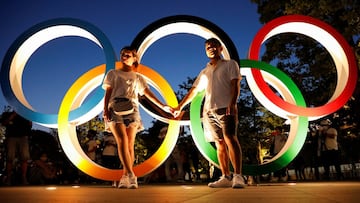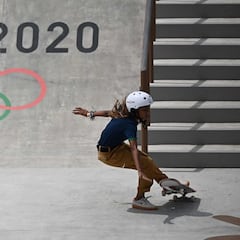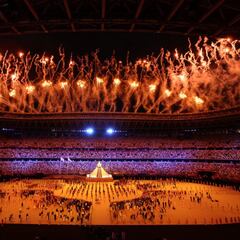Why are the 2021 Olympic Games called Tokyo 2020?
There has been much confusion over the naming of the games so we're providing somereasons for it staying as Tokyo 2020.


The decison to keep the name as 'Tokyo 2020' was taken by IOC President Thomas Bach back in March 2020 when the games were initially postponed. There are two main factors involved in the decison: the Olympic legacy and the impact of a marketing change on finances.
The legacy aspect
Olymnpic Games are held every four years to pay homage to the ancient Olympics. The four-year gap was called an 'Olympiad' and was the way ancient Greeks measured time, instead of years. To suddenly change the naming style for one edition would disrupt the entire naming pattern.
There is no naming precedent for a postponed Olympics. The closest reference is the 1940 Tokyo Games, which were relocated to Finland when the Japanese became international pariahs after their invasion of China in 1937. The Helsinki games were ultimately canceled after the outbreak of the Second World War but both Finland and Japan were able to host them in 1952 and 1964 respectively. However, neither was postponed and the rescheduling meant there was no change to the four-year cycle.
The lost-by-war 1940 Tokyo Olympics, and ‘64 posters. pic.twitter.com/iW0002iqru
— Stephen Wade (@StephenWadeAP) July 22, 2021
The financial aspect
The aspect which probably plays a greater role is finance. The world of the 1940s is very different to today and nowadays the Olympics are as much about the sport as they are a revenue generator for the host country and the IOC.
The amount of money that is poured into sporting events, be it branding or commercial revenue is enormous. Indeed, the IOC has been under huge pressure to cancel the games this year due to the pandemic. But due to the huge financial fallout such a move has been declined.The budget for the games is supposed to be around $20 billion.
The money and finances behind the Tokyo 2020 Olympic Games https://t.co/eix1ui6ZYd
— BBC Business (@BBCBusiness) July 23, 2021
"It's probably safe to say that if the Tokyo Olympics is cancelled, it would probably be the biggest insurance pay-out event of its kind, there's no question about that," Professor Jack Anderson at the University of Melbourne says.
When Japan won their Olympic bid back in 2013 steps were taken to ensure a level of profitability from the games. Important marketing such as branding and merchandise were developed and utilised years ago. The Tokyo 2020 logo has been used for marketing since 2015 so any last minute change would have disrupted years of marketing. It has been estimated that organizers spent $1.3 billion making billboards, giant countdown clocks, and ads with the 2020 logo.
Related stories
To go back and change all of the branding, at such short notice and after such a long time using it, would have made the games even more expensive, especially as there is no revenue from spectators in the stadiums and around the city this year.
The Games are extremely unpopular in Japan due to fears about the spread of covid-19 and have been rocked by numerous scandals.

